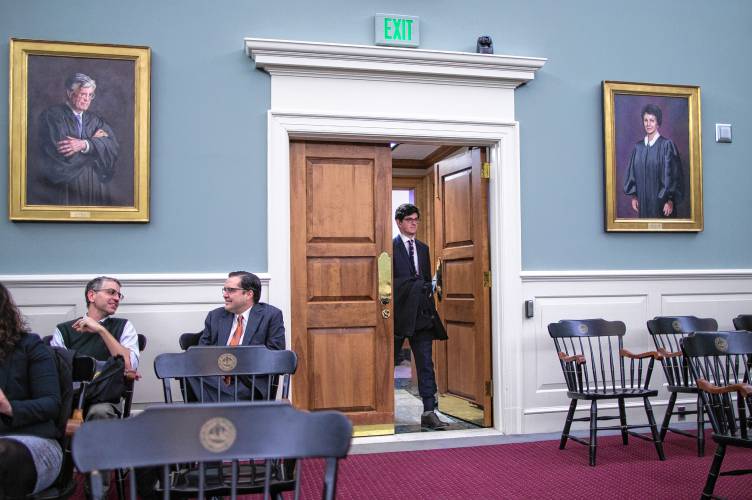N.H. Supreme Court Hears Oral Arguments in Owen Labrie’s Appeal of Felony Conviction
By Alyssa Dandrea
On the heels of a failed appeal, St. Paul’s School graduate Owen Labrie returned to the state’s highest court Wednesday to argue his high-profile defense team provided poor legal representation at his 2015 sexual assault trial. Labrie, now 23, was acquitted of felony rape charges, but convicted of using a computer to lure a 15-year-old girl for sex as part of the “Senior Salute,” a now-infamous tradition at St. Paul’s where upperclassmen competed for intimate encounters with younger pupils. Labrie maintains his trial attorneys misunderstood the statute governing the computer-use crime and did not defend him against the charge. A state prosecutor challenged that argument Wednesday, telling New Hampshire Supreme Court justices that Labrie’s trial team did a good job. Assistant Attorney General Sean Locke said Labrie was found not guilty of the most serious crimes – three counts of aggravated felonious sexual assault – that could have landed him in prison for 30 to 60 years. “You have to look at the ineffective assistance claim in terms of what’s going on in the entire trial,” Assistant Attorney General Sean Locke said, advising the justices to view Labrie’s legal representation more broadly and not in reference to a single conviction. Earlier this month, the Supreme Court decided in a 3-0 vote to uphold Labrie’s convictions, including the contested “certain uses of computer services prohibited” charge, which carries a mandatory penalty of lifetime registration as a sex offender. His discretionary appeal, before the high court for oral arguments Wednesday, is his second attempt to get a new trial. During oral arguments in both appeals, attorneys focused largely on questions surrounding Labrie’s intentions at the time of the “salute” invitation, and whether he planned at the outset to have sexual intercourse with the girl in a secluded room of St. Paul’s Lindsay Center. Labrie’s defense at trial was that no sexual penetration occurred. However, his attorneys failed to tell the jury during opening statements and closing arguments what Labrie’s intentions were at the time he contacted the girl over Facebook and email, appellate public defender Christopher Johnson argued Wednesday. “These lawyers, as shown by their post-conviction testimony, they recognized that the mental state element was a place where they wanted to stake their defense. The problem was they totally failed to execute that theory,” he said. Johnson said attorneys did not ask whether Labrie “intended penetration” from the beginning; rather, they raised just two issues before jurors: “consent and whether penetration happened.” Johnson told the justices it would have been possible for jurors to find that “the intent to penetrate arose in the heat of the moment in the Lindsay building and was not a part of what he intended when he sent the messages.” In response, Chief Justice Robert Lynn asked: “But doesn’t that ... undercut the basic theory that there was no penetration?” Jurors ultimately found that Labrie did have sex with the girl. He was convicted of statutory rape and endangering the welfare of a child, both misdemeanors, in addition to the felony computer-use charge. Johnson maintained Wednesday that the defense never explicitly raised the issue of intent, which is, in part, why the case is before the high court on appeal. Labrie filed his discretionary appeal at the Supreme Court after a lower court judge denied his bid for a new trial based on identical merits. Following a multi-day hearing in February 2017, Merrimack County Superior Court Judge Larry Smukler ruled that Labrie had “highly experienced and prepared defense attorneys who, overall, made reasonable strategic and tactical decisions throughout the trial.” Should the Supreme Court rule in Labrie’s favor, the case would be remanded back to the lower court for a new trial on only those charges. The three justices who presided over oral arguments Wednesday took the matter under advisement and will issue a written decision within three to six months. In the meantime, Labrie is asking Smukler to suspend the remainder of his one-year jail sentence, which was handed down in October 2015. Labrie previously served two months in jail after he admitted to violating a court-imposed curfew. Prosecutors said he traveled repeatedly to Boston to see a girlfriend; he said he made the trips to meet with attorneys and pursue higher education. County prosecutors have objected to Labrie’s request, saying in recent court filings that “the goals of sentencing have not been met.” The victim’s family has also objected, according to Assistant County Attorney Joesph Cherniske. Sexual assault survivor Chessy Prout and her family were not in attendance Wednesday. A year after the high-profile criminal trial, Prout shed her anonymity and told her story for the first time on national television. She has since published a memoir, I Have the Right To: A High School Survivor’s Story of Sexual Assault, Justice, and Hope, giving readers an unfiltered look into her assault, the criminal trial and her decision to go public. (Alyssa Dandrea can be reached at 369-3319 or at adandrea@cmonitor.com .)
|
.
Any original material on these pages is copyright © BishopAccountability.org 2004. Reproduce freely with attribution.
